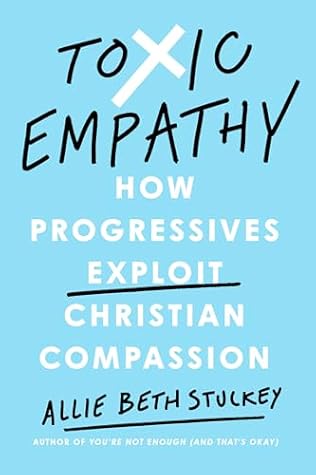More on this book
Community
Kindle Notes & Highlights
Read between
January 8 - January 8, 2025
Empathy by itself is neither loving nor kind; it’s just an emotion. Love, on the other hand, is a conscious choice to seek good for another person.
Toxic empathy says we must not only share their feelings, but affirm their feelings and choices as valid, justified, and good. This confusion has not only made us a morally lost people but it’s also harmed the very people empathy-mongers claim they’re trying to help: the truly marginalized and vulnerable.
For the Christian, empathy should never compel us to affirm that which God calls sinful or to advocate for policies that are ineffective at best and deadly at worst.
Kindness is good, and empathy can be good too. But empathy that affirms sin or lies is always misguided.
Euphemisms obscure the truth to make a position seem more palatable. Think “reproductive rights” for killing an unborn child, or “gender-affirming care” for bodily mutilation.
the progressive left uses real-life tragedies and trendy slogans to manipulate well-meaning people like you and me. For example, to promote infanticide, they tell us “abortion is health care.” To destroy God-ordained sex differences, they say “trans women are women.”
They asked a simple question: What’s the difference between a child conceived in rape and a child not conceived in rape? In other words, why are diagnoses or the circumstances surrounding a person’s conception justification for killing them?
A good rule of thumb is this: if you’re on the right side of an issue, you don’t have to lie to convince people to join you.
Earthly marriage is a representation of the great heavenly marriage of Jesus and his church, with both the bride and the groom designated with their own particular roles. That’s why the redefinition of marriage as anything other than a man and a woman matters so much. Two men or two women can’t represent Christ, the groom, and His Bride, the church: only a man and woman can do that. This definition has spiritual, eternal, and gospel significance.
If I believe that God is the Creator and Authority over all things, and if I believe that His ways are better than ours, it’s illogical to support institutionalizing sin.
People agree that Zambia, for example, has the right to protect its citizens, but when one asserts that America has the same right, they’re met with accusations of bigotry. America has this right and responsibility just as any other nation does.
The early church gives us an example of the kind of radical generosity to which Christians are called: “And they were selling their possessions and belongings and distributing the proceeds to all, as any had need” (Acts 2:45).
These Christians gave their resources voluntarily, convicted by the Holy Spirit to do so. Social justice activists push for the forced forfeiture of resources, compelled by the government, in an effort to guarantee equal outcomes.
Take Latasha Morrison’s idea of racial reconciliation, for example, from Be the Bridge. Reconciliation implies that one group has wronged the other. But it cannot be accurately said that white people as a whole have harmed black people as a whole. This is an oppressor-oppressed dynamic that we find in secular social justice ideology, not in the Bible.
Today, we’re not so different from our pagan predecessors. It’s just that our bloodthirst has been given politically correct names, such as “abortion” and “gender-affirming care.” We are still very much in the barbaric business of butchering children’s bodies and exploiting them as political objects.
Children are always the unconsenting subjects of progressive social experiments: from abortion, to the redefinition of the family, to reproductive technology, to gender ideology, to government policies that push their safety and well-being to the wayside.
It’s tempting as Christians to believe that we can be nicer than God, that we can appeal to people better by being more polite or gentler than He is. We feel like we need to take God off the hook for the harsher things He’s revealed through Scripture.
We rebuff attempts at emotional manipulation hoisted upon us by toxic empathy and instead rely on God’s Word and the capable minds he gave us as our guides. Over and over again, we choose truth-filled love over its poisonous counterpart, trusting that God’s ways are better and more loving than any the world could muster.


